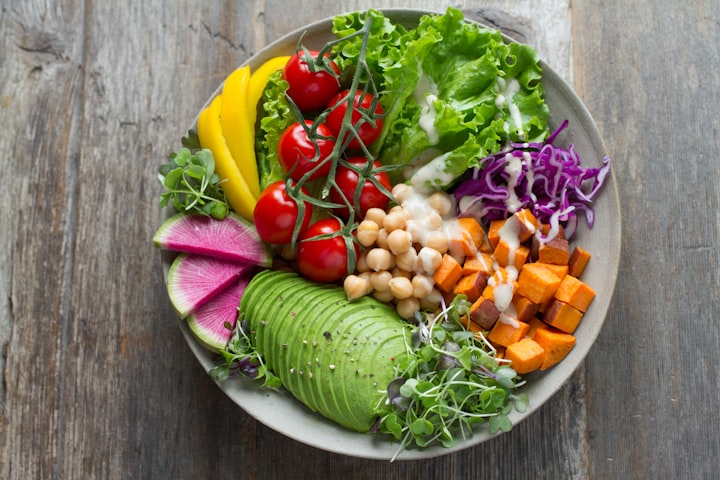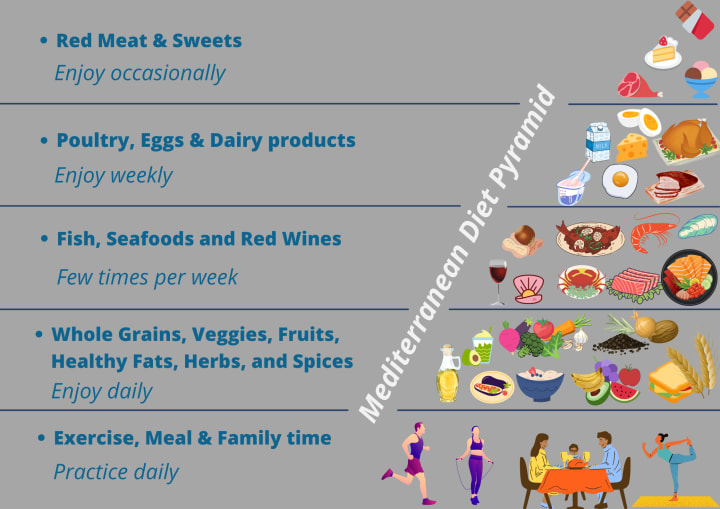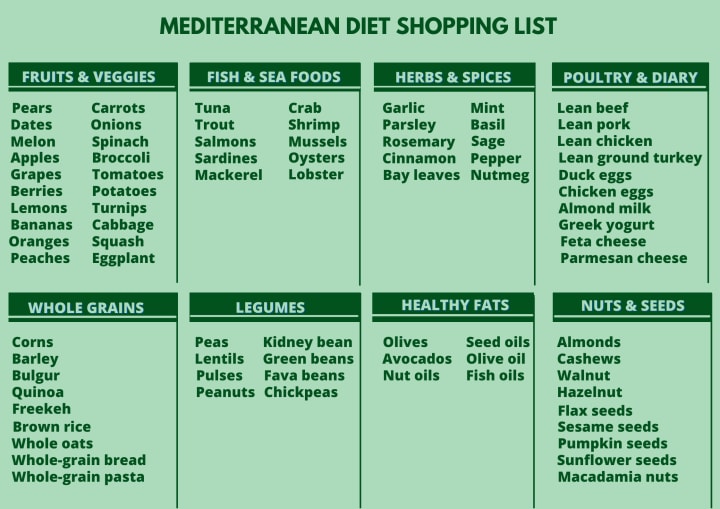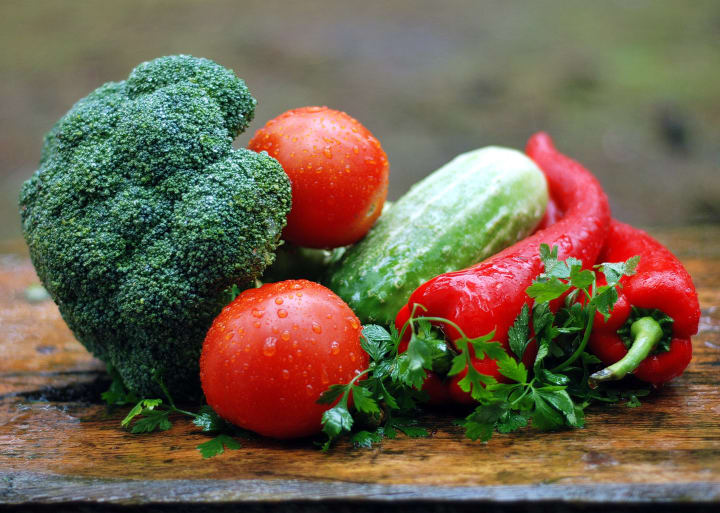
Whenever we heard the word ‘diet,’ what comes into our mind is eating in smaller quantities or cutting out whole food groups. But how about getting a chance to fill your plate with grilled veggies and roasted chicken with indulgences like pinot noir while maintaining a healthy diet plan?
It can be possible if you go with the most heart-healthy eating plan, the ‘Mediterranean Diet.’
This diet also links to countless health benefits without maintaining a strict diet pattern. That’s why this Med diet is reported as the best diet out of 40 other eating plans.
So, why should you follow the Mediterranean diet and lifestyle? And why is it called the best? Let’s find out!
What is the Mediterranean diet?
Let’s not address it as a diet. But consider it as a simple lifestyle or eating habits seen in Greece, Italy, or Spain. It also includes enjoying the meal with others and doing physical activity as well.
It’s needless to say that by following this diet, you’re not going to get the feeling of dining on a Turkish island or at a Greece villa overlooking the Mediterranean Sea. But it can cut down the chances of heart disease, certain cancers, cognitive decline, and type-2 diabetes.
And the foods include whole grains, veggies, legumes, poultry eggs, fish, lean beef, and chicken (not fried!).

What is the Mediterranean diet consist of?
There’s no single diet plan to follow, partly because of variations between different countries.
But you can prepare your Mediterranean diet plate loaded with some unprocessed, fresh, and easy-to-cook recipes. And this is very common in every Mediterranean country.

What to eat on a Mediterranean diet:
- Plant-based foods should be in your diet. It involves a wide variety of fresh veggies and fruits, potatoes, whole grains, bread (whole-grain or pita), nuts, seeds, legumes, herbs, and spices.
- You can have cheese, yogurt, eggs, and poultry but in moderation. You’ll also go for seafood and fish at least two times per week.
- ‘Good’ fats get a thumbs-up, so use extra virgin olive oil, seeds, nuts, and avocados instead of margarine or butter.
- Satisfy your sweet tooth by having some fruit desserts. Red meat and sweets are OK sometimes.
What to drink on a Mediterranean diet:
- Water: your go-to beverage in this dietary pattern.
- Red wine: One glass for women and one to two glasses for men per day. But this is optional.
- Tea and coffee: you can have some herbal tea. And coffee is also acceptable.
What not to eat on a Mediterranean diet:
- There is no hard & fast rule in the Mediterranean diet. But start avoiding processed or packaged foods.
- Avoid refined grains such as white pasta, pizza dough, white bread, etc.
- Cut back on foods containing added sugars like pastries, candies, and sodas.
- Say NO to highly processed foods; anything labeled as “diet” or “low-fat” or looks like ‘factory-made.’
- Don’t go for processed meats like sausages, hot dogs, etc.
- Say ‘GOODBYE’ to refined oils such as canola oil, cottonseed oils, and others. And stop using trans-fat like butter and margarine.

Why you should choose the Mediterranean diet:
From keto to DASH to vegan, there are plenty of diets to reduce the spare tire. But, the winner is the Mediterranean diet, as reported by U.S. News & World Report.
1. It’s not about calorie counting

When talking about the Med diet, you can skip the calorie tracking part. Eating habit focuses on having healthy foods, staying physically active, and sharing a meal with others. In short, enjoying the whole lifestyle.
The Mediterranean shopping list includes foods rich in proteins, vitamins, antioxidants, high fibers, and omega-3 fatty acids. These nutrient-dense foods offer myriad health benefits and also improve your overall health.
2. It’s a plant-based diet!

One of the reasons it’s called the best diet is because it’s plant-based. You’ll find a huge basis of plant-based foods in the Mediterranean diet pyramid.
Load your plate with fresh veggies and fruits if you’re on a Med diet. They’re the foundation of this diet pattern. Provide an excellent source of vitamins, minerals, and dietary fibers.
What’s more, you can explore a Med diet with plant-based proteins such as beans, nuts, and seeds. Try some healthy plant fats like olive oil, avocados, nuts, and seeds — loaded with MUFAs (monounsaturated fatty acids) and PUFAs (polyunsaturated fatty acids).
Be brave and go for whole grains rich in vitamins, minerals, proteins, and fibers. Also, add some fresh herbs and spices — a host of many health benefits.
3. Fats are not banned!

The best thing about this diet is you can add fats. Just got to search for the great ones. Seeds, nuts, olive oil, avocado oils, and some dairy products are good sources of nutrients and fatty acids. Besides giving your mouth a good flavor, they also fight against many diseases from cancer to diabetes.
The Journal of Clinical Endocrinology and Metabolism states that following this diet enriched with extra virgin olive oil for two years will increase serum osteocalcin concentration — have protective effects on bone.
4. Acts synergistically

Go for the Mediterranean diet. Your health will thank you! Foods in this diet come up with a unique combination of vitality-promoting factors.
Complex carbs like whole-grain bread, potatoes, oatmeal, quinoa, and other whole plant foods are the powerhouse of energy that your body needs. And the fibers in them improve gut health.
Chicken, turkey, lean ground beef, beans, low-fat milk, yogurt and, fish such as salmon and tuna are good sources of lean proteins. They’re beneficial for weight loss, building muscle, reducing the risk of heart disease, and also increasing metabolism.
Essential fats like nuts, seeds, avocados are high in omega-3 fatty acids. It drops the chances of heart attack, lowers triglycerides levels, and improves the blood vessels’ health.
Fruits such as watermelon, orange, mango, apple, blueberries are rich in antioxidants. They protect your body against certain cancers.
5. Get a stamp of approval on herbs and spices over salt

Start flavoring your foods with herbs and spices instead of salt. As this diet is famous for promoting heart health, it’s essential to stop the use of salt. Sodium is related to high blood pressure and thus certain cardiovascular diseases. On the contrary, spices & herbs not only add flavors but also pack a punch in health.
Parsley, basil, sage, garlic have antioxidant, anti-bacterial, and anti-inflammatory properties — improve your bone, brain, and heart health. They have the potential to reduce blood clotting, blood pressure, and blood sugar. Fight against cancers, and support your immune system as well.
Bay leaves, mint are useful in migraine treatments, improve digestion, effective in irritable bowel syndrome. And also improve cold functions.
Cinnamon, clove, rosemary, cilantro, oregano, pepper are antimicrobial and prebiotic in nature. They improve gut health, digestion, memory performance, drop down the chances of blood pressure, blood sugar, and type 2 diabetes.
6. Whole-fat dairies are welcomed!

Whole-fat or full-fat dairy products contain a decent amount of nutrients besides fat. Dr. Kiah Connolly, a board-certified emergency medicine physician and the health director at Trifecta says, whole fat dairy contains saturated fat with bad cholesterol (LDL) still it does have some nutrient-dense properties. As it also comes up with good cholesterol, it can neutralize the adverse effects of LDL.
Full-fat cheeses like ricotta, feta, parmesan are rich in calcium and sodium. They’re also a good source of essential amino acids and unsaturated fatty acids — thus beneficial for muscle growth, reducing body fat, brings down the level of blood pressure and high cholesterol.
Almond milk and whole milk Greek yogurt are high in nutrients and proteins. They’re effective for your gut health, protect against osteoporosis, reduce obesity, and also have some roles on the immune system and heart health.
But you can’t have those dairy products regularly, only a few times per week.
7. Pack a health punch!

There is no question that the Mediterranean diet is one of the healthiest eating patterns to follow.
The Mediterranean diet and cardiovascular health:
A study in the New England Journal of Medicine in 2018 stated that people who started to follow the Med diet supplemented with nuts and olive oil — were a 30% less chance of having a stroke, heart attack, and other cardiovascular diseases than people who were in a low-fat diet.
The Mediterranean diet and weight loss:
A study on younger women showed that those who followed this diet had a lower body mass index (BMI).
According to a study published in 2019 by The Lancet: Diabetes & Endocrinology indicates, if you add extra virgin olive oil to the diet, you can reduce -0.41 kg weight on average. In the case of nuts, the loss is about -0.016 kg on average — compared with the people not following this diet.
The Mediterranean diet and diabetes:
One study published by National Center for Biotechnology Information found that it reduces blood glucose concentration, induces weight loss, and improves the lipid profile. And it ultimately cuts down the chances of cardiovascular risk in people detected with type-2 diabetes.
The Mediterranean diet and cancer:
A review of 83 studies published in 2017 in the journal Nutrients suggests that the diet reduces the chances of colorectal cancer, and breast cancer and prevents cancer-related death.
Another research published in 2015 by JAMA internal medicine found that women, who maintained a Med diet and had extra virgin olive oil in their diet — were 61% less likely to have breast cancer than those on a low-fat diet.
The Mediterranean diet and brain health:
A 2016 review published in the journal Frontiers in Nutrition suggests that a Med diet can slow down cognitive decline, improve memory and executive function, and deal with Alzheimer’s disease.
Additional study in the journal The Americal Academy of Neurology says this diet can reduce the brain’s age by 5 years thanks to higher fish and lower meat intake.
Bottom line
“Exercise is king. Nutrition is queen. Put them together and you’ve got the kingdom” — Jack Lalanne.
Mediterranean diet is not only healthy but also flexible and easy-to-follow than any other diet. But it’s important to watch how much you eat and avoid unhealthy foods to reap all the benefits.
The USDA’s recommended daily calorie intake should be from 1600 to 3200 for an adult depending upon the age, sex, and level of physical activity.
So, eating healthy, staying fit, and maintaining a good lifestyle is your daily goal then you are ALL SET for this diet.
Originally published at Medium.
Check out another article on the role of protein powders in muscle gaining. Thank you.
About the Creator
SATHI
A writer on Medium.MSc. in Biological Science. Write about Science, Wellness, Travel, Food & Health. Bookworm. Love to travel. Trying to learn German but ist Nicht gut.






Comments
There are no comments for this story
Be the first to respond and start the conversation.